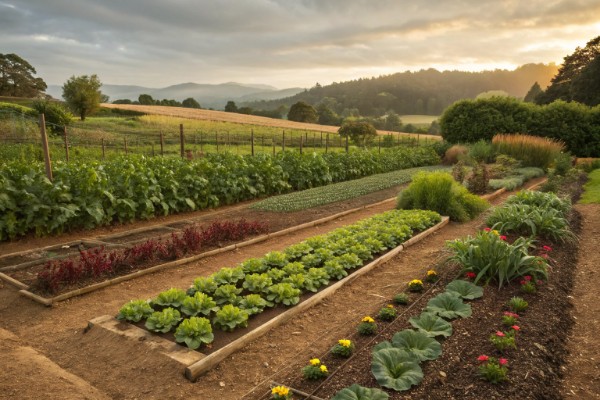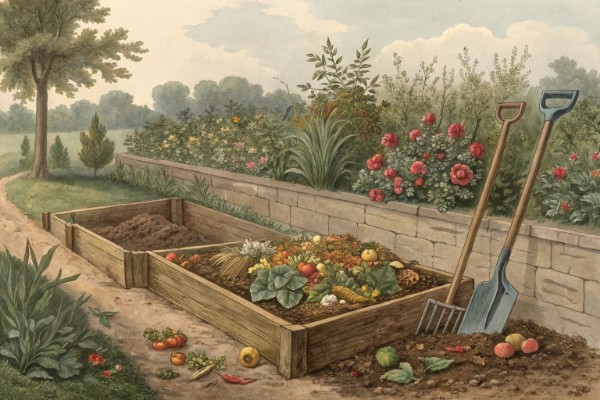Food Security: Growing Your Own Garden for Reliable Harvests

Food Security
Boost your food security by planting even a modest backyard garden—just 10 square feet can yield up to 20 pounds of fresh vegetables. Gardens cut grocery bills, slash food miles, and directly enhance your household's food security. Learn how digging into your dirt can strengthen your community, your budget and the sustainability of your meals.
Cheatsheet: Reliable Home Harvests for Food Security
🌱 Choose Calorie-Dense Crops
- Potatoes, sweet potatoes, beans, squash, kale, carrots, garlic, peas
- 1 m² feeds 1 adult for 1 week (British Medical Journal)
- Diversity boosts yields and nutrition
🗺️ Plan and Prepare Space
- Select a minimum 10 m² (107 sq ft) with 6+ hrs sun
- Build beds or use containers; elevate for drainage
- Avoid toxic runoff zones
🌦️ Schedule Planting
- Stagger sowing every 2-3 weeks for steady harvests
- Track local frost dates (ex: USDA, RHS)
- Protect early/late crops with fleece or row cover
💧 Boost Soil & Water Efficiency
- Compost: add 2.5-5 cm (1-2 in) yearly
- Mulch: suppress weeds, retain moisture
- Drip irrigation: saves up to 50% water vs. hose
🩺 Health, Nutrition, Self-Sufficiency
- Home veg has 25-100% more vitamins (USDA)
- Organic methods exclude pesticides
- Grow ≤70% of vegetables for 1 person in 15 m² (160 sq ft)
🛠️ Tools and Products You’ll Need
- Trowel, spade, watering can, hand fork
- Protective gloves
- Quality seeds & starts
- Organic compost or soil improver
- Row covers, mulch, labels, planters (if needed)
🚩 Reliable Harvest Action Plan
- Test and enrich soil with homemade/organic compost
- Lay out beds or containers; ensure sun and drainage
- Plant early crops (peas, kale, lettuce); stagger main crops
- Water 1x/day, early morning or dusk. Drip: 1-2 in (2.5-5 cm) per week
- Direct mulch around crops; weed weekly
- Inspect for pests/rot weekly; hand-remove or use organic controls
- Harvest at peak ripeness; replant spent spaces
- Preserve surplus: freeze, dry, ferment, can
How Growing Your Own Garden Boosts Your Food Security
After years tending my vegetable patch, I've learned gardening isn't simply about flavorful tomatoes and crunchy cucumbers. The act of planting seeds, nurturing seedlings, and gathering ripe produce directly contributes to enhancing food security at home and within the community.
Food Security Begins in Your Backyard
Food security refers to reliable access to nutritious, affordable food. Growing vegetables, herbs, and fruit at home reduces dependence on unpredictable global supply chains.
"According to the FAO, approximately 2.3 billion people globally face moderate or severe food insecurity. Home gardens offer a practical, scalable approach to alleviate this crisis."
I remember the summer when supply disruptions left my local market with bare shelves. Yet, stepping into my garden, I felt reassured—all around grew fresh spinach, vibrant peppers, and ripe zucchinis.
Self-Reliance and Sustainability
Gardening boosts our self-sufficiency, helping buffer against sudden price hikes or shortages. My kale didn't notice inflation; my carrots never worried about shipping delays.
Sustainable gardening methods further enhance food security. Composting kitchen scraps enriches the soil naturally, minimizing reliance on chemical fertilizers shipped from distant locations.
Resilient Varieties for Changing Climates
Choosing climate-hardy, locally adapted plants strengthens your garden's resilience. Drought-tolerant beans, heat-resistant tomatoes, and frost-hardy greens have thrived despite summer heatwaves of 95°F (35°C) or unexpected frosts at 28°F (-2°C).
- Scarlet runner beans: handle drought effortlessly.
- Swiss chard: survives chilly evenings beautifully.
- Cherry tomatoes ('Sun Gold'): grow vigorously in warm climates.
Community Connections and Collective Security
Home gardening builds neighborhood connections, forming a community-wide safety net. Last autumn, I traded surplus pumpkins and eggplant for a neighbor's delicious homemade pickles and preserves.
Such exchanges reduce waste, increase variety, and weave stronger local bonds—vital for collective food resilience.
Practical Steps for Enhancing Food Security in Your Garden
- Plant diversely: a varied garden reduces vulnerability to pests, diseases, and unpredictable weather.
- Preserve and store: extend seasonal abundance by pickling, freezing, drying, or canning surplus harvest.
- Save seeds: retain seeds from resilient plants to cultivate future generations naturally adapted to your environment.
When tending our gardens, we're not merely growing food; we actively contribute to greater resilience and stability, ensuring nourishment remains within reach—come rain or shine.
Frequently Asked Questions About Gardening for Improved Food Security
Which Edible Plants Offer the Best Yield for Beginners?
If you're new to gardening, focus on easy-to-grow plants that produce an abundant harvest. Zucchini, potatoes, cherry tomatoes, leafy greens like spinach and kale, beans, and radishes grow quickly, require minimal maintenance, and yield consistent food supplies throughout the growing season.
How Can Small Spaces Provide Significant Food Harvests?
Limited outdoor space doesn't need to prevent abundant harvests. Utilize vertical gardening techniques or container gardening to plant crops like strawberries, herbs, peppers, lettuce, and tomatoes. These methods maximize available area while ensuring consistent access to fresh produce, enhancing your household's food security.
What Strategies Extend the Growing Season and Increase Food Availability?
To expand your harvest window, use techniques like cold frames, row covers, and greenhouses. These protective structures allow cultivation to begin earlier in spring and continue later into autumn, significantly extending produce availability beyond typical growing periods. Even colder climates gain extra weeks of production, resulting in improved food reliability.
How Can Gardeners Preserve Surplus Produce for Long-Term Consumption?
Preserving excess garden produce boosts household food reserves effectively. Process surplus fruits and vegetables through methods such as canning, freezing, drying, fermenting, or pickling. Proper preservation significantly extends the shelf life, providing nutritious options during times when fresh produce may be limited or unavailable.
What Natural Methods Maintain Soil Fertility to Sustain High Production?
Ensuring fertile soil maintains consistent, abundant harvests year after year. To enrich your garden naturally, utilize practices such as regular composting, crop rotation, mulching, and planting cover crops like clover or legumes. These measures replenish nutrients, maintain nutrient-rich soil structure, and promote resilient yields that strengthen overall food supply stability.
Food security starts with a handful of seeds and a patch of soil you trust. Growing your own food means fewer empty shelves and more full plates, season after season. You learn to read the weather, watch your soil, and respect the work that real harvests demand. The reward? Food that tastes like it should, and the kind of self-reliance you can pass down. If you’re looking to deepen your roots, food sovereignty is within reach, right in your backyard. Want to keep your pantry stocked year-round? Greenhouse growing makes that possible. Remember, food security is built on steady habits, honest labor, and a willingness to learn from your land. Grow wisely, harvest well, and let your garden work for you.
The Money Saver's Guide to Maximizing Garden Yield for Food Security
Plan Efficiently for Maximum Yield
- Select productive crops: Beans, potatoes, zucchini, tomatoes, and kale offer high output per plant for minimal expense.
- Calculate space productivity: Square-foot gardening can yield up to 5 times more produce per square meter (10.7 sq ft) than traditional row planting.
- Implement succession planting: Replant quick-grow crops (radishes, spinach, lettuce) every 2 to 4 weeks for sustained harvest.
Cost-Effective Seed Sourcing Strategies
- Seed savings: Heirloom varieties provide seeds to reuse yearly, reducing long-term costs.
- Community swaps: Join local gardening groups or seed-saving clubs for free varied seeds.
- Bulk purchasing: Sharing large seed packages with neighbors cuts down initial investment by up to 50 percent.
DIY Nutrient-Rich Composting
- Home compost bins: Repurpose kitchen scraps (vegetable peelings, coffee grounds, eggshells) for free, effective garden fertilizer.
- Compost tea: Soaking compost in water for 24-36 hours produces nutrient-packed liquid fertilizer.
Reduce Watering Costs
- Collect rainwater: Installing rain barrels saves approximately 1,300 gallons (4,921 liters) per household annually.
- Mulch strategically: Organic mulch conserves moisture, reducing watering needs by up to 40 percent.
- Irrigate efficiently: Drip irrigation minimizes water waste compared to sprinkler systems by delivering water directly to plant roots.
Preservation Methods for Long-Term Savings
- Canning: Preserve excess harvest easily; properly canned vegetables retain nutritional value for 1 to 2 years.
- Drying methods: Sun or oven-dried herbs, fruits, and vegetables last months without refrigeration.
- Root cellaring: Store root vegetables (potatoes, carrots, beets) in cool, humid, dark conditions to extend freshness 3 to 6 months.
Find out which plants will thrive in your garden!
Answer a few fun questions and get custom plant recommendations perfect for your space. Let’s grow something amazing together!

start your season






